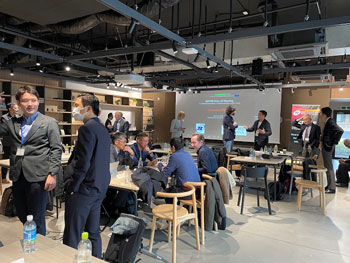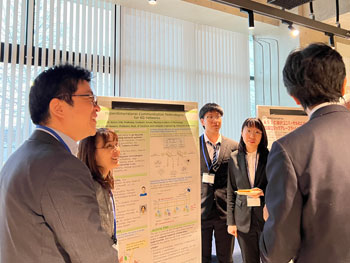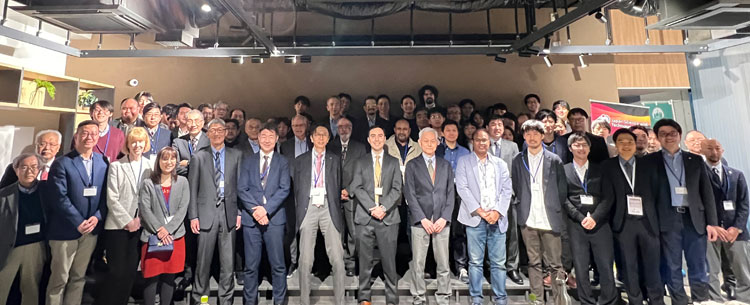News & Topics
ASPIRE Kick-Off Unites Leading Scientists and Rising Research Talent in the Fields of Semiconductors and Telecommunications
Adopting Sustainable Partnerships for Innovative Research Ecosystem (ASPIRE)
The FY2023 Adopting Sustainable Partnerships for Innovative Research Ecosystem (ASPIRE) initiated 46 projects across 7 fields and commenced research in February 2024.
- ASPIRE:
- https://www.jst.go.jp/aspire/en/
- Press Release:
- https://www.jst.go.jp/pr/info/info1661/index_e.html
In the telecommunications and semiconductor fields, ASPIRE held a joint workshop and a kick-off meeting at the Hiroshima University Higashi-Hiroshima Campus from March 5th to 6th, 2024. The workshop and meeting were held as sponsored programs of the General Conference of the Institute of Electronics, Information and Communication Engineers (IEICE), and were open to the public. We welcomed special guests including the program director of the U.S. National Science Foundation (NSF), which supports many researchers in both fields as Japan’s partner country, and an expert from the U.S. Embassy in Japan.
On the first day of the workshop, Deepankar Medhi, Program Director of the NSF’s Computer and Network Systems Division, gave an introduction of support projects in the field of semiconductors, an explanation of NSF’s cooperation with Japan and the Japan Science and Technology Agency (JST), and set expectations for ASPIRE. Next, Prof. Yuichi Tanaka from Osaka University, who served as the Principal Investigator (PI) for an AdCORP telecommunications project (the predecessor of ASPIRE), along with Prof. Antonio Ortega, his partner PI from the University of Southern California, and Prof. Shunsuke Fukami from Tohoku University, the PI of ASPIRE in the semiconductor field, shared their research findings and discussed efforts to promote international talent exchanges.
On the second day, the kick-off meeting for the ASPIRE adoption projects started with remarks from Kenjiro Miyano, Program Director of ASPIRE, and Omar Sharif from the U.S. Embassy in Japan. Next, Ann Chrstine Von Lehmen, Program Director of the Computer and Network Systems Division, NSF, gave a talk titled “Networking and Telecom Research at NSF: the NeTS Program,” in which she introduced the NSF’s overall research support system and discussed the importance and expectations of ASPIRE in building a sustainable cooperative relationship with Japan. Subsequently, Allen Baum of Esperanto Technologies in the United States, invited as a guest speaker in the semiconductor field, gave a lecture on the theme of international joint research titled “International (Research) Collaboration Types, Futures, Rewards.” Finally, Jorge N. Tendeiro (Professor, Office of Research and Academia-Government-Community Collaboration, Hiroshima University) gave a thought-provoking presentation about Japanese universities and the research community. These lectures were valuable for the many researchers gathered in the hall and served as a strong message to the next generation of research leaders.
The planning presentation began with a talk by Naoaki Yamanaka (Professor, Keio University), Program Officer of the telecommunications field, regarding his expectations for ASPIRE. The PIs of the four projects adopted as “ASPIRE for Top Scientists”: Hiroshi Esaki, Tomoaki Otsuki, Tetsuya Kawanishi, and Akihiro Nakao, then presented their research plans. Guests and participants raised numerous questions and shared their opinions, leading to a vibrant discussion. We reaffirmed the importance of building mutual trust in international collaborative research.
The presentation of the semiconductor field began with the introduction by Hideharu Amano (Professor, Keio University), Program Officer of the semiconductor field. The PIs of the two projects adopted as “ASPIRE for Top Scientists”: Satoshi Hamaguchi and Shunsuke Fukami, presented their research plans, leading to an active discussion.
Finally, all participants got together at the networking session, which included presentations by the PIs of the projects adopted as “ASPIRE for Rising Scientists”: Kaoru Ota, Shinya Sugiura, and Katsuya Suto from the telecommunications field and Tomohiro Ueno, Atsutake Kosuge, and Katsuhiro Tomioka from the semiconductor field. During the session, there was lively communication and discussion, and we are excited about their next steps. The attendees noted that the presentations by leading researchers were inspiring for the next generation and sparked lively discussions, making it a valuable opportunity for shaping future research. Some mentioned that the strong and lasting collaboration between JST, NSF, and experts has motivated researchers and expressed hopes for future cooperation between funding agencies.
ASPIRE will progress each project while prioritizing meaningful exchanges between leading scientists and the next generation of researchers, as well as fostering interdisciplinary collaboration, drawing from the insights gained during this event.

Meeting venue

A scene from the poster session

Group photo after the meeting
